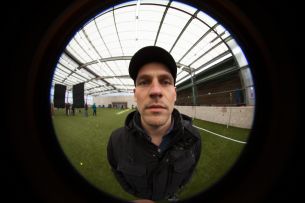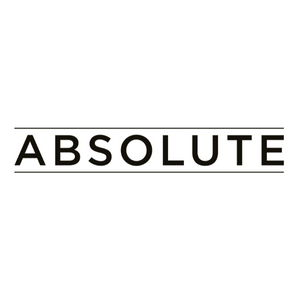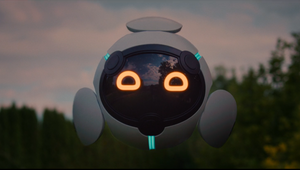
The A – Zee of Making It in Post Production

Absolute Post’s Zdravko Stoitchkov, better known as Zee, on cracking the 2D world, juggling software skills, Absolute’s teamwork mentality, and why London’s dodgy weather has helped the city become the epicentre of global post production.
LBB> How did your interest in post and 2D begin?
ZS> Well, I’ve been playing around with Photoshop ever since I first heard about it. I used to go to school in the UK and I know a lot of people from here. But when I went back to Bulgaria, I went to university and studied something completely different: social work with clinical psychology as a profile. I mostly worked with people with addictions. I still think that I’ll get back into social work one day, but not in the way the social system works now.
LBB> How did you get your first break in the industry?
ZS> When I came back to London, this guy I went to school with, Michael Smith, was a Flame Op here – he was a full blown Flame Op at like 17, which is insane. He’s at the Mill New York now, but he was at Absolute when I came back from Bulgaria. When I was catching up with him, he showed me around the building and I loved it straight away. In 2010, the year I arrived at Absolute, it was a really quiet summer so I just started coming in because I was fascinated with the way it all worked. I started learning Combustion which I still think is one of the best pieces of software, which was sadly discontinued.
LBB> So you skipped being a runner entirely?
ZS> Pretty much, yeah. Basically, I just kept my head down and tried to learn as much as possible and eventually I ended up helping out on a Skunk Anansie promo Ben Robards was doing. It was one of the first things I did. It was cool because I moved up really quickly. I was more than happy to go through the usual running process, but it turned out I just rapidly picked up the whole thing as I went.
LBB> Most people don’t tend to jump straight into the deep end. How easy was it for you to learn on the job?
ZS> At first it was a challenge. I had zero experience in video compositing, but it’s easier to learn here because everyone shares. I don’t think you find that as much in other places. I have friends who work all over. At other post houses it seems that some people figure out a way to do something but they don’t want to share their method because it gives them an edge against everyone else. But here everyone seems to share and so we learn quicker.
LBB> Did you pick up any mentors that have been a major influence along the way?
ZS> Yeah, there’s so many. People like Simon Holden, Dave Smith, Phil Oldham, Ant Walsham and Ben Robards who were making videos that I was watching when I was a kid, and only later found out that they have done them. It is an honour to work alongside everyone here. Jonathan Box and Mark Epstein too, who showed me efficiency.
Of course, originally my friend Michael took me under his wing and showed me the ways, so did my friend Ilia who was and still is at The Mill. I learned a great deal from Owen Saward, he's amazing at explaining and knows what he's talking about. Essentially, everyone here has influenced me and helped me get to where I am.
The great thing at Absolute is, if I don’t know how to do something, I can just ask. People will tell me different ways to do it and I’ll listen to all the ways and figure out a mixed solution. That’s my whole method.
LBB> In terms of clients, who have you enjoyed working with throughout your time at Absolute?
ZS> I have enjoyed working with many people. Like Olly Williams, Anthony and Valerie, Los Perez, Chris Cairns. I love working with Dexter Navy who does a lot of A$AP Rocky’s videos. He really likes to push things. He doesn’t follow what is expected, he just knows what he wants to get out of it and then does it. I like working with directors who do what they feel is right rather than what they think people might like.
LBB> Is there anyone in the wider industry who inspired you to get involved in the creative industry?
ZS> I was lucky to have a lot of friends from my school who got into the industry. I mentioned Michael and Ilia – they were two of my best friends when I went to Holland Park School, and they just happened to be two of the best Flame Ops in the world so I was lucky to be able to learn from two different styles, different schools.
In fact, Holland Park produced a crazy amount of talent. Dexter also came from my school, and there’s a director duo who’ve just been signed to RSA who are doing some incredible films – George Curran and Adriano Vilanova. I’m pretty sure Aubrey Woodiwiss, who’s a colourist, was also at Holland Park - or at least his brother was.
LBB> Do you think that 2D artists today really need to be 3D savvy as well?
ZS> It feels like if you don’t understand 3D then you’re gonna be phased out, and vice versa. The CG people need to know how to do a bit of compositing too. It just makes sense. Most software packages are becoming a lot more diverse, you can edit in grading software and comp in editing software. It's all unifying, but from different directions. Much like the whole industry. To me, in the first place, it shouldn't have been so disjointed. It’s strange if you think about it, and I didn’t understand this about the workflow, to have one place that cuts, another that does audio, grades, post, then goes to somewhere that checks it before it goes to TV. It turns into a big machine. Clunky. If you have to change something, you have to go back a few stages, which may take days, so today it feels like one place should be able to do most things, unless it’s super specialised - like really intricate sound design, then you go to a studio solely does that, because of course the other end of the spectrum is jack of all trades.
LBB> So the 2D and 3D teams work together in close harmony?
ZS> Whenever we work on a bigger job, we set up a project room. If there’s a lot of 3D in it, we’ll get all the 3D and 2D people in the same room and everyone shares their knowledge and learns a bit about each other’s skills. For example, Phil, who is an old school flame op, has been doing it for 15 years+ and one day just decided to learn Maya. Now he’s fluent in CG which is insane because the edge that gives someone to go from 2D to 3D is totally different. Being fluent in both means you know what end result you want to get out of 3D in order to make it look good in 2D, rather than just doing a bit of geometry and lighting. There is a lot to learn from the 3D boys too.
LBB> Why do you think London, and in particularly Soho, is seen as the post capital of the world?
ZS> My theory is the shit weather. If the weather was good, then people wouldn’t spend so much time in dark rooms. If you’re in LA and working 18 hours every day you can just say ‘screw it. I’m off to the beach’. People get really passionate about it and as its dark outside you might as well be in another dark place making nice things. Having said that, even in New York and in LA, many of the top artists are from London and they still do crazy hours.
LBB> What would you say inspires your work?
ZS> It depends on the project but I always try to replicate the real world, unless it’s something quite abstract that you need to do in a stylised way. I just like to imitate real life. The best level of compositing for me is when people really aren’t sure if you have comped it, like it looks in-camera.
LBB> You’ve done a lot of work on promos - do you still find them rewarding?
ZS> For me, it’s one of the best bits of filmmaking out there. You get to tell a story in a short amount of time, and you also get a lot of freedom. There’s not much money in it nowadays – in fact there’s pretty much no money in it – but that means there are often completely unadulterated ideas flying around.
It’s not like when Dave Smith was making promos back in the day, the budgets then were going into millions, but now people often do promos for absolutely no money, even the bigger artists. In the end of the day, if you’ve got a good idea, you could shoot it on your phone and it could still look amazing. Well, almost…
I don’t buy this belief that people aren’t into promos any more. We’ve done promos for artists who I still to this day don’t know who they are and sometimes their views on Youtube are ridiculous – like over 100 million. People re-watch promos a lot more than they do feature films, series and things like that. Adverts have the real budgets and time frame, but I do love doing promos and short films.
LBB> What advice would you give to anybody who wants to follow in your footsteps?
ZS> Don’t be scared. Listen to what people say. But at the end of the day, trust in your opinion and believe in your gut, make your own footsteps. With the power of the internet, knowledge is at the edge of our fingertips and with the fast paced development of technology equipment and software are getting cheaper so people can do their own thing.
LBB> Finally, what’s one thing your colleagues don’t know about you?
ZS> Not sure. I guess one thing most people don't know about me is that I have a blog in which I write every day. Good luck finding it!













